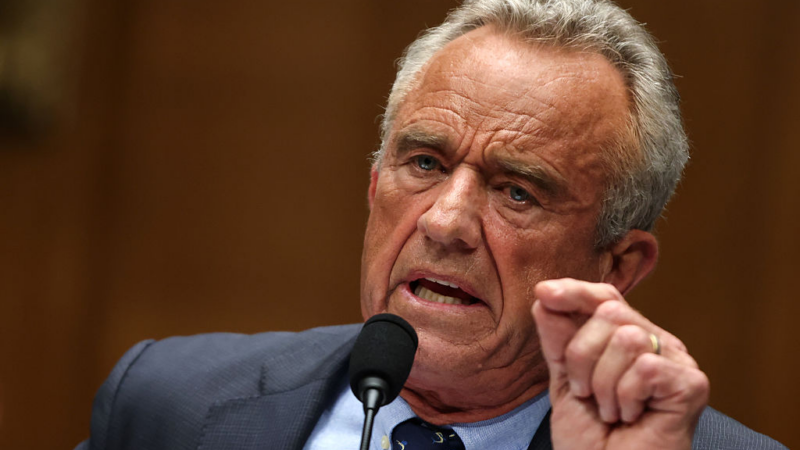MAHA Commission report paints a dark picture of U.S. children’s health
The Trump administration released a sweeping report Thursday, offering its analysis of what’s driving chronic disease among the nation’s children.
The report titled, “The MAHA Report: Make Our Children Healthy Again” catalogues a range of drivers behind what it describes as a “chronic disease crisis,” including high rates of obesity, asthma, autoimmune conditions and behavioral health disorders among kids.
The 72-page document is a product of the MAHA Commission, which was established by President Trump through an executive order on Feb. 13. The commission, chaired by Health Secretary Robert F. Kennedy, Jr., enlisted various cabinet members, including the Secretaries of Agriculture and Education and the head of the Environmental Protection Agency, and met in private over the last few months.
Much of the report reflects priorities Kennedy has discussed during recent public appearances.
It identifies four major drivers for childhood chronic illness: poor diet, environmental chemicals, chronic stress and lack of physical activity, and overmedicalization. In keeping with the messaging that has animated the MAHA alliance, the report pins the blame, in part, on conflicts of interest and corporate influence in the food, chemical and pharmaceutical industries.
The report says it will be used by the MAHA Commission to develop a strategy for the administration to implement within 180 days of the February executive order.
The broad strokes of the analysis reflect concerns that researchers in public health have raised for many years, particularly related to nutrition, lifestyle and exposure to pollution and other harmful chemicals in our food and environment.
“This is a real American problem, and it’s not one that we’re seeing quite so dramatically in other countries,” says Dr. James Perrin, a professor of pediatrics at Harvard Medical School.
But the report also underscores what has troubled many in public health and medicine since the inception of the MAHA platform.
Notably absent is a thorough discussion of how socioeconomic factors like poverty are the underlying drivers of why some children are faring so poorly. And exactly how this monumental public health challenge will be solved isn’t clear, given ongoing cuts to public health infrastructure, including staff, grants and contracts, and the administration’s desire to roll back regulations.
“They make a great diagnosis and they have a very weak treatment plan,” says Dr. Philip Landrigan, a professor of pediatrics at Boston College. “It’s impossible to read this report and not think about the disconnect between the noble words in this report and the reality of what the Kennedy team is doing on the ground to EPA and CDC and the National Institutes of Health.”
Another concern? The report also questions vaccine safety and suggests that possible links to childhood disease have not been thoroughly studied.
“That is simply not true. There have been abundant studies,” says Landrigan.
The report sketches out a range of proposed solutions to the problems it outline, including asking the National Institutes of Health to fund new trials on whole-food diets and on potentially harmful ingredients in the food supply; pushing NIH and the Food and Drug Administration to improve post-marketing surveillance of pediatric drugs; supporting new pediatric drug safety research; and launching a national lifestyle-medicine initiative.
It’s not clear where the funds or staffing will come from for these priorities.
Mideast clashes breach Olympic truce as athletes gather for Winter Paralympic Games
Fighting intensified in the Middle East during the Olympic truce, in effect through March 15. Flights are being disrupted as athletes and families converge on Italy for the Winter Paralympics.
A U.S. scholarship thrills a teacher in India. Then came the soul-crushing questions
She was thrilled to become the first teacher from a government-sponsored school in India to get a Fulbright exchange award to learn from U.S. schools. People asked two questions that clouded her joy.
Sunday Puzzle: Sandwiched
NPR's Ayesha Rascoe plays the puzzle with WXXI listener Jonathan Black and Weekend Edition Puzzlemaster Will Shortz.
U.S.-Israeli strikes in Iran continue into 2nd day, as the region faces turmoil
Israel said on Sunday it had launched more attacks on Iran, while the Iranian government continued strikes on Israel and on U.S. targets in Gulf states, Iraq and Jordan.
Trump warns Iran not to retaliate after Ayatollah Ali Khamenei is killed
The Iranian government has announced 40 days of mourning. The country's supreme leader was killed following an attack launched by the U.S. and Israel on Saturday against Iran.
Iran fires missiles at Israel and Gulf states after U.S.-Israeli strike kills Khamenei
Iran fired missiles at targets in Israel and Gulf Arab states Sunday after vowing massive retaliation for the killing of Supreme Leader Ayatollah Ali Khamenei by the United States and Israel.








